| Srl | Item |
| 1 |
ID:
185526
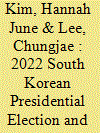

|
|
|
|
|
| Summary/Abstract |
The 2022 South Korean presidential election was the country’s most closely contested election since a democratic direct electoral system was initiated in 1987, with less than a 1 percent difference separating the two major candidates among 34 million votes cast. Despite some parallels with and continuities from previous elections, the 2022 election saw new voting alignments emerge based on one topic: gender equality. In this essay, we explain how and why gender became such a prominent issue during the 2022 election campaign, and how this affected voting patterns, especially among male and female voters in their twenties and thirties. Specifically, we argue that gendered voter behaviour during the election arose from rising anti-feminist sentiments among young men, and that the two main presidential candidates politicized the issue to maximize support from this group. This in turn triggered the consolidation of a young female voting bloc. Using an original survey conducted in January 2022 with an approximate nationally representative sample of 1,017 respondents, we identify two possible causes of rising anti-feminist sentiments among young men: the belief that women receive preferential treatment in employment opportunities and mandatory military service for men. In addition, through an embedded survey experiment run before the election, we proposed that political candidates with pro-gender messages would be less likely to receive support from young men, while candidates with anti-gender messages would be likely to receive more support; these projections were confirmed by the actual voting breakdowns of the recent election. The results suggest that the new administration must handle gender issues with extreme care to ensure that divergent perceptions of the gender divide do not become further polarized over the next few years, since such a development could very well fuel democratic deconsolidation in South Korea.
|
|
|
|
|
|
|
|
|
|
|
|
|
|
|
|
| 2 |
ID:
131386
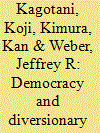

|
|
|
|
|
| Publication |
2014.
|
| Summary/Abstract |
Since its democratization, South Korea's foreign relations with Japan have become increasingly volatile. We investigate the diversionary incentives behind these fluctuations in South Korean foreign policy during 1988-2011. We show evidence that, similar to mature democracies, economic turmoil is driving Korean leaders to divert the public attention toward low-intensity disputes against Japan. However, unlike mature democracies, our results reveal that public approval ratings and national elections do not encourage leaders to engage in the diversionary behavior due to South Korean domestic political institutional settings and party system. These findings highlight challenges to foreign policy making in a new democracy, an issue that has not been considered in detail in the literature. We conclude that although historical antagonism and US commitment to East Asia may affect the Japan-South Korea relationship, economic diversionary incentives significantly determine the fluctuations in Japan-South Korea disputes.
|
|
|
|
|
|
|
|
|
|
|
|
|
|
|
|
| 3 |
ID:
071715
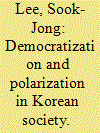

|
|
|
|
|
| Publication |
2006.
|
| Summary/Abstract |
This article identifies and analyzes economic and political factors behind the polarization of Korean civil society. Both the growing economic disparity between the rich and the poor and the tightened job market for the younger generation since the 1997-1998 financial crisis have contributed to a sharp divergence in views on how best to approach reforms. More importantly, political flux and instability deriving from the current "transitional politics" have aggravated the political polarization. The three major actors in this transitional politics-power elites, civic movement organizations, and the media-play a divisive rather than unifying role. Given that political institutions are still weak and a political culture for compromise remains largely absent, polarization of Korean society is likely to continue until the intense passions of the politicized civil society are dampened by successful institutionalization of conflict resolving mechanisms.
|
|
|
|
|
|
|
|
|
|
|
|
|
|
|
|
| 4 |
ID:
027792
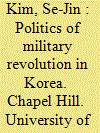

|
|
|
|
|
| Publication |
Chapel Hill, University of North Carolina Press, 1971.
|
| Description |
xiv, 239p.hbk
|
| Standard Number |
0807811688
|
|
|
|
|
|
|
|
|
|
|
|
Copies: C:1/I:0,R:0,Q:0
Circulation
| Accession# | Call# | Current Location | Status | Policy | Location |
| 010384 | 951.904/KIM 010384 | Main | On Shelf | General | |
|
|
|
|
| 5 |
ID:
101132
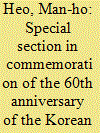

|
|
|